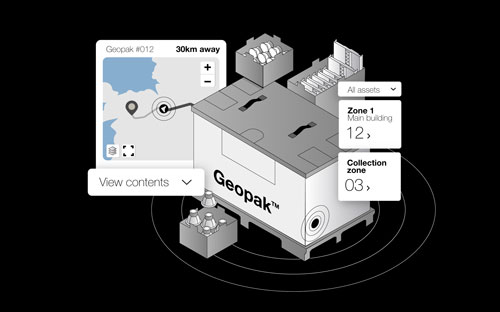Whitecroft Lighting is rolling out its innovative environmental packaging initiative following a number of trial projects.
The Geopak system was trialled with building contractor Balfour Beatty on Scotland’s first Net-Zero college where it’s calculated to have saved two tonnes of waste.
Designed to cut waste and help developers track lighting assets, the Geopak system eliminates tonnes of traditional cardboard packaging waste, half of which is incorrectly recycled on-site, and will drastically reduce the amount of single use wrapping used for securing boxes on pallets, says the company.
It will also save thousands of pounds in waste management costs.
Geopak features a modular tote box system, made from recycled materials, designed to securely and efficiently package up to 90 per cent of Whitecroft’s lighting range.
By maximising space and reducing unnecessary packaging, it streamlines transportation and cuts waste, improving sustainability and circularity in the construction sector.
Once emptied, the totes fold flat and are returned to Whitecroft, where they can be reused for multiple projects at least 12 times, making the system sustainable, circular and cost-effective.
Because Geopak is modular, the totes can be repurposed for a variety of different projects and packaging needs.
To prevent misplaced deliveries of its valuable products, Geopak features GPS enabled tags that can be tracked on-site using geofencing to an accuracy of two to three metres.
This enables developers to keep track of each shipment in real-time and decide the precise location for efficient on-site storage, stock management and installation.
Finally, the GPS tags also ensure that Whitecroft can quickly retrieve the collapsed Geopak totes for reuse in future deliveries.
Whitecroft developed the Geopak system in collaboration with Cardiff University and consultants PDR, mapping the entire journey, from production to installation.
The innovative concept was then put into action through a partnership with Balfour Beatty, debuting during the construction of Fife College’s new multi-million-pound Learning Campus in Dunfermline, Scotland, which will be a Net-Zero project.
‘What is particularly inspiring about working on the Geopak project with Whitecroft is that it is not just about recycling or reusing packaging material, or even striving to meet a Net Zero carbon target,’ Jim Brannan, head of supply chain development at Balfour Beatty, told the Circular Lighting Report. ‘It’s about rethinking and reimagining our processes and innovating right from the design stage to the manufacturing of materials, through to the construction.’
Whitecroft says using Geopak will take the equivalent of 100,000 cardboard cartons out of the supply chain over the next two years.
Matt Paskin, Solutions and Marketing Director, Whitecroft Lighting, explained: ‘Sustainability and circularity are important to Whitecroft Lighting, so we have developed a range of energy-efficient products, reduced embodied carbon in our manufacturing and designed products that can be reused and then recycled to minimise end-of-life waste.
‘With Geopa, we’re taking these philosophies to the next level by combining circularity with digitalisation when developing new buildings or retrofitting existing ones. We aim to implement Geopa on all our major projects to help our partners meet their waste reduction targets, boost site efficiency, and use data insights to reduce the build programme.’
• Learn more about sustainable lighting at Circular Lighting Live 2025, Recolight’s flagship conference and exhibition, which takes place on Thursday 25 September 2025 at the Minster Building in the City of London. Free to specifiers, Circular Lighting Live 2025 will feature leading experts, specifiers and policy makers who will share their insights into forthcoming standards and legislation, emerging technologies and new business models. More info: www.circularlighting.live

